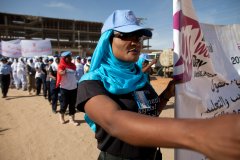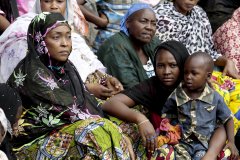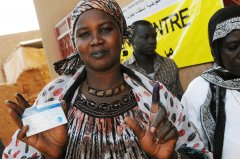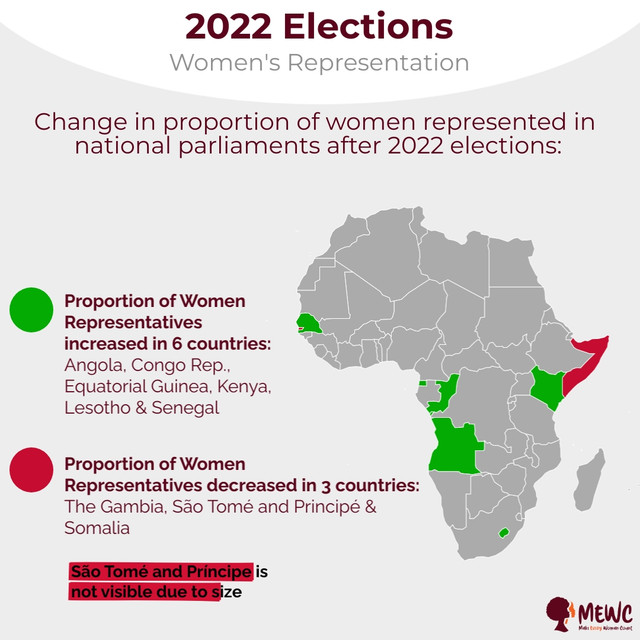Gender Issues Showlist
Women, Peace & Security
UNSCR 1325 calls on all parties to: protect and respect the rights of women and girls in conflict & post-conflict; increase women participation in all conflict resolution, peacekeeping and peace-building & to end impunity by prosecuting perpetrators of sexual and other violence on women and girls
index.php?option=com_content&view=category&id=56&Itemid=1913
Human Rights of Women
Thirty six years after the adoption of CEDAW, many women and girls still do not have equal opportunities to realize rights recognized by law. Women are denied the right to own property or inherit land. They face social exclusion, “honor killings”, FGM, trafficking, restricted mobility, early marriage,...
index.php?option=com_content&view=category&id=44&Itemid=1908
Violence Against Women
Violence against women is the most shameful human rights violation. Gender based violence not only violates human rights, but also hampers productivity, reduces human capital and undermines economic growth. It is estimated that up to 70 per cent of women experience violence in their lifetime
index.php?option=com_content&view=category&id=69&Itemid=1912
Political Participation & Leadership
Where women are fully represented, societies are more peaceful and stable. Women political participation is fundamental for gender equality and their representation in positions of leadership must be a priority for all Africans governments.
index.php?option=com_content&view=category&id=65&Itemid=1911
Latest News
- COTE D'IVOIRE: South-South Meeting to Promote Gender Equality and Combat Deforestation
- RWANDA: Rwanda Set to Launch Cervical Cancer Elimination Plan
- NIGERIA: Over 5,000 Nigerian Women Stranded in Iraq - Govt
- SUDAN: Healthcare Collapse Threatens Pregnant Women in Sudan's Sharg El Nil
- GHANA: President Nominates 12 More Ministers
- Senegal: Parliamentary election 2024
- Mauritius: Parliamentary election 2024
- Ghana: Presidential and Parliamentary Elections
- Botswana: Parliamentary elections 2024
- Algeria: Presidential Election 2024
UGANDA: Delayed Breast Feeding Killing Our Newborns
Source: The New Vision
Uganda has one of the highest deaths of newborns in the world with almost 40,000 newborns dying every year. While the specific deaths due to delayed breastfeeding and use of alternative feeds for newborns is not known evidence shows this to be a major contributor to new born deaths.
A study conducted in Ghana found that the risk of death among newborns was almost three times higher among children who were breastfeed after one hour of birth.
In Uganda, 35% of mothers are substituting breast milk with alternatives such as baby milk formula, cow's milk, gripe water in urban areas and plain water, glucose fluids, and black tea in semi and rural areas.
These alternatives are wrongly perceived as trendy, classy and safe yet they are not suitable for newborns because of their limited nutritional value and risk of contamination in comparison to the readily available breast milk.
These alternative feeds have a high risk of being mixed with unsafe water, stored in unhygienic conditions and poorly prepared leading to infection to the new born, malnutrition and death of newborns.
It is estimated that exclusive breastfeeding in accordance with the World Health Organization recommendations would save many children's lives each year in Uganda and yet prompt and exclusive breastfeeding practices continue to reduce among the affluent and the poor alike.
The World Health Organization recommends that newborns are initiated on exclusive breastfeeding immediately or within the first hour after birth.
Although almost all mothers in Uganda breastfeed their newborns, studies indicate that about half of the infants are not breastfed within the first one hour as is recommended, thereby putting these newborns at an increased risk of death.
Breastfeeding reduces infections among newborns as it contains agents that fight certain agents of infections. Mothers who breastfeed also experience improved health through reduction of risks of developing certain disease such as type 2 diabetes, breast cancer, ovarian cancer, among others.
The situation is exacerbated by low general public awareness of the importance of immediate onset of breast feeding fueled by low antenatal visits, home births, and virtually almost non existence post birth visits and care at most health facilities.
This situation is also exacerbated by the physical distance between newborns words and those of new mothers which leads to the separation of mother and baby immediately after birth. This makes immediate initiation of breast feeding impossible.
The ministry of health should ensure there is increased emphasis on the importance of breastfeeding immediately after delivery during antenatal visits and that mothers are given the necessary help to ensure they are in position to breastfeed within an hour after delivery.
Village health teams should be equipped with appropriate information on the benefits of immediate onset of breastfeeding after delivery and coupled with appropriate behavioural change communication materials for dissemination in the community.





